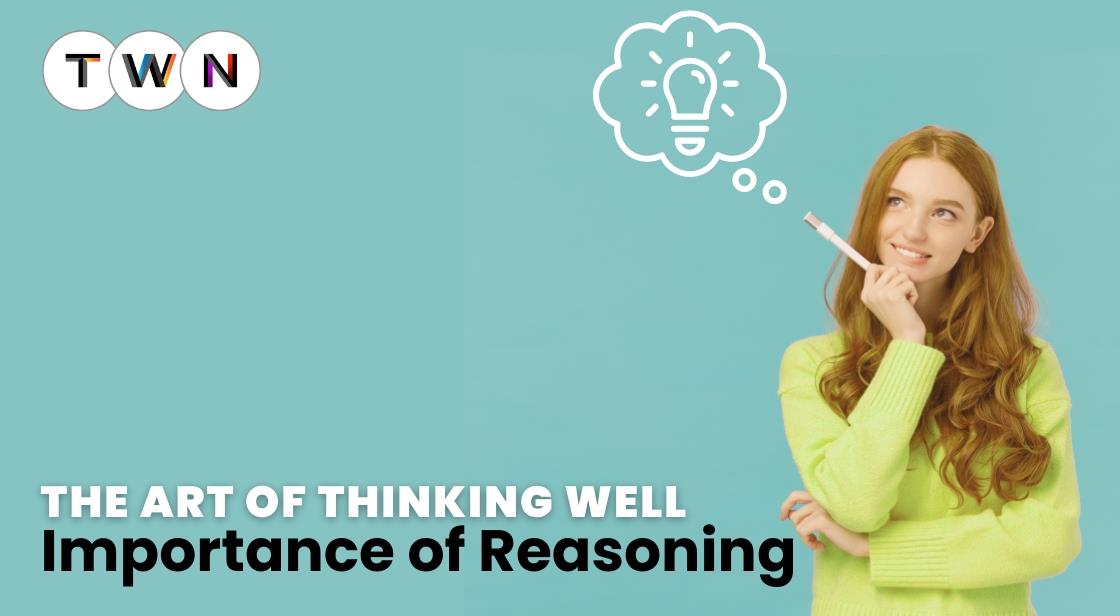Importance of Reasoning: The Art of Thinking Well

Blog Post
In a world brimming with information and choices, reasoning and the art of thinking well hold immense importance. This article explores the significance of critical thinking, logical reasoning, and decision-making skills in today's context.
Incorporating reasoning into our lives is essential for making sound decisions and achieving success in various areas of life. Reasoning allows us to think critically, analyze information, and evaluate arguments, which are all crucial skills in both personal and professional contexts.
At its core, reasoning involves the ability to think logically and make rational decisions based on available information. It helps us to avoid making impulsive or emotional decisions, which can lead to negative consequences.
By incorporating reasoning into our lives, we can learn to approach problems and challenges with a more objective and rational mindset.
In addition to helping us make better decisions, reasoning can also improve our communication skills. When we are able to think critically and articulate our thoughts clearly, we are more likely to be taken seriously and to be able to persuade others.
This is especially important in professional settings, where clear communication can make the difference between success and failure.
Furthermore, reasoning can also lead to personal growth and development. When we are able to reflect on our own thoughts and beliefs, we can better understand ourselves and our motivations.
This self-awareness can help us to identify areas for improvement and to develop strategies for personal growth.
With this understanding, we can better design the world around us to promote better reasoning. Here are some ways to incorporate reasoning into your life.
Discover how mastering these skills can enhance problem-solving abilities, foster adaptability, and contribute to personal and professional success.
Reasoning is more complicated than it seems at first glance. It is not merely an intellectual pursuit but a way of life that includes logic, belief, ethics, and emotion. With this new understanding of mental processes, we can better design the world around us to promote better reasoning and more logical choices. Here are some ways to incorporate reasoning into your life.
corporating reasoning into our lives is crucial for success in various areas of life. It helps us to make sound decisions, communicate effectively, and grow and develop as individuals. By cultivating this skill, we can become more confident and capable individuals who are better equipped to navigate the challenges of life.
Importance of Reasoning: The Art of Thinking Well
What is reasoning?
Reasoning is the process of using logic and critical thinking to make informed decisions and solve problems. It involves analyzing and evaluating information, considering different perspectives and options, and making judgments based on evidence and reasoning. Reasoning is an important cognitive skill that is used in all areas of life, from personal decision-making to professional problem-solving.
It is essential for making sound judgments and developing effective solutions to complex problems. In essence, reasoning allows us to make sense of the world around us by applying logic and critical thinking to make informed decisions.
Reasoning is a vital component of living a happy and fulfilling life. We do it every day. Logic and rationality allow us to make decisions and solve problems. Reasoning is the tool we use to make sense of the world.
We use reasoning when we decide what to wear, where to live, how to spend our free time, and who to spend time with. It's a way of thinking that we use every day to figure out what we believe and want.
Reasoning is something we can improve through practice and education. When we improve our reasoning skills, we become better thinkers and feel more fulfilled in our lives. We can't avoid reasoning!
The Significance of Critical Thinking
Critical thinking is a fundamental aspect of reasoning that involves analyzing information, questioning assumptions, and evaluating arguments. In an era of misinformation and fake news, honing critical thinking skills is essential to distinguish fact from fiction.
Studies have shown that individuals with strong critical thinking abilities are better equipped to make sound judgments, solve problems effectively, and adapt to changing circumstances.
Enhancing Logical Reasoning
Logical reasoning is another integral component of the art of thinking well. It enables individuals to construct valid arguments, identify fallacies, and draw logical conclusions. Developing strong logical reasoning skills fosters clear and coherent thinking, facilitating effective communication and persuasive abilities.
Moreover, logical reasoning helps individuals identify potential biases and make informed decisions based on evidence and rationality.
The Role of Decision-Making
Skills Reasoning and decision-making go hand in hand, as the ability to make informed choices is an essential outcome of sound reasoning. Effective decision-making skills involve gathering relevant information, considering various perspectives, weighing pros and cons, and anticipating potential outcomes.
Individuals with well-honed decision-making skills are more likely to make thoughtful choices that align with their goals and values, leading to better outcomes and minimized regrets.
How do Emotions affect our Thinking?
How do emotions affect reasoning? Emotions can distort how we think. When we feel an intense emotion, it's more difficult to think deeply about the topic at hand. This can lead to poor reasoning. For example, say you are in the middle of a heated debate with your spouse, and you find out that they have been a misunderstanding between both of you.
You might not be able to think about anything but the fact that they were unfaithful. Your anger distorts your reasoning and prevents you from thinking about other reasons why they might have cheated on you. You might think that you're never going to get married again because of this experience.
This is one of the instances of how emotions can affect our reasoning. If we want to reason better, we need to take emotional values into account. The more intensity you have in your emotion, the less likely you will think logically.
How does Limited Attention Impact our Reasoning?
With limited attention, we are in a constant state of information overload. And it shows in the way we think. There are so many stimuli bombarding us at any given moment that it is impossible to process them all. We need to pick and choose what to focus on. But when our attention is limited, it cannot be easy to make rational decisions.
For example, one study found that shoppers are less likely to buy healthy food when they are in a hurry. With limited attention, people are less likely to think critically about their choices.
For example, they are more likely to purchase fast food, even when they know it's not the healthiest option. If we want to make a proper decision, we need to be aware of how limited attention affects our reasoning process and avoid this mental trap.
One way to do this is by taking a break every once and a while and refocusing your attention on something else. It will be difficult to avoid the temptation of instant gratification, but taking time for yourself will accept you to make better decisions in the long run. To learn more about how little attention impacts reasoning and how it can be improved, read on!
What are the Consequences of these Observations for Designing a World that Promotes Better Reasoning?
The implication of these findings for designing a world that promotes better reasoning is to prioritize our ability to reason well. When designing a world that promotes better reasoning, it is essential to make it easier for people to make logical decisions. For example, you could make it easier for people to make clear and straightforward choices.
You can do this by taking benefit of our tendency for "choice paralysis" and creating limited options. Another way to design a world that promotes better reasoning is by providing space and time for people and minimizing distractions. This will allow people to think more clearly.
Also Read: 5 Rules for Developing a Digital Mindset
Tips for Incorporating More Reasoning into Your Life
1. Practice Active Listening: One of the most important skills for reasoning is the ability to listen actively. This means listening carefully to what others are saying, asking questions, and clarifying any misunderstandings. Active listening helps you to understand different perspectives and make more informed decisions.
2. Evaluate Evidence: Reasoning involves analyzing and evaluating evidence to make informed decisions. When presented with information, take the time to evaluate its reliability, validity, and relevance. Consider the source of the information, any biases or assumptions that may be present, and whether there is enough evidence to support a particular claim.
3. Consider Alternative Perspectives: When making decisions, it's important to consider alternative perspectives. This helps you to avoid confirmation bias and to evaluate all available options. Take the time to research different viewpoints, ask for feedback from others, and consider the potential consequences of different decisions.
4. Use Critical Thinking: Critical thinking involves questioning assumptions, analyzing information, and evaluating arguments. When faced with a problem or decision, use critical thinking to break it down into smaller parts, identify key issues, and develop logical solutions. This helps you to approach problems in a more objective and analytical way.
5. Practice Mindfulness: Mindfulness involves being present in the moment, paying attention to your thoughts and feelings, and observing them without judgment. By practicing mindfulness, you can improve your self-awareness and become more mindful of your thoughts and decisions.
6. Learn from Mistakes: Everyone makes mistakes, but it's important to learn from them. When you make a mistake, take the time to reflect on what went wrong and how you can avoid making the same mistake in the future. This helps you to develop a growth mindset and to continually improve your reasoning skills.
The Benefits of Mastering the Art of Thinking Well
-
Problem-Solving: Strong reasoning skills enhance problem-solving abilities by enabling individuals to approach challenges with a logical and systematic mindset. This leads to innovative solutions and better outcomes in various personal and professional scenarios.
-
Effective Communication: The art of thinking well improves communication skills, as individuals can articulate their thoughts clearly, present logical arguments, and engage in constructive discussions. This fosters effective collaboration and understanding in both personal and professional relationships.
-
Analytical Skills: Reasoning develops analytical thinking, allowing individuals to break down complex issues into manageable parts, identify patterns, and extract meaningful insights. This analytical mindset is highly valuable across different domains, such as business, science, and technology.
-
Adaptability: The ability to reason well equips individuals with adaptability and flexibility in the face of change. They can evaluate new information, reassess their beliefs, and adjust their strategies accordingly. This adaptability is crucial in an ever-evolving world.
-
Enhanced Decision-Making: By mastering the art of thinking well, individuals can make informed decisions based on evidence, logical reasoning, and a comprehensive understanding of the situation. This leads to better outcomes and reduced decision-making biases.
Conclusion
The importance of reasoning and the art of thinking well cannot be overstated in today's world. By developing critical thinking, logical reasoning, and decision-making skills, individuals can navigate complex challenges, make sound judgments, and achieve personal and professional success.
The benefits of mastering this art extend beyond individual growth, positively impacting society as a whole. In a world driven by information, cultivating these skills becomes a valuable asset that empowers individuals to think critically, reason logically, and contribute meaningfully to their communities.
Reasoning is not merely a tool; it is an art that can transform the way we perceive and interact with the world. Embracing the art of thinking well opens doors to endless possibilities, allowing individuals to approach life's challenges with clarity, rationality, and wisdom.
Incorporating more reasoning into your life can help you to make more informed decisions, avoid biases, and approach problems in a more objective and analytical way. By actively listening, evaluating evidence, considering alternative perspectives, using critical thinking, practicing mindfulness, and learning from mistakes, you can develop your reasoning skills and improve your decision-making abilities.
These tips are designed to help you enhance your analytical thinking and problem-solving skills in all areas of your life. By incorporating more reasoning into your daily routine, you can develop a more balanced and rational approach to decision-making and become a more effective thinker overall.
You May Like
EDITOR’S CHOICE












